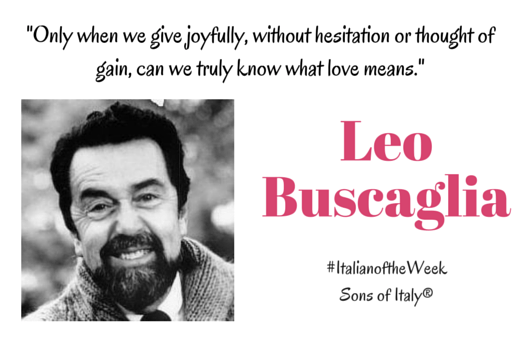THE LOVE TAPE
“The easiest thing to be in the world is you. The most difficult thing to be is what other people want you to be. Don’t let them put you in that position.”
Leo Buscaglia
“Love is life. And if you miss love, you miss life.”
Leo Buscaglia
The process of decluttering our house—ridding ourselves of the accumulated stuff of decades—has proven to be a painful, emotion-laden process. We have taken at least 60 contractor-sized bags to the county landfill, have given away everything we could, and filled several large containers at the nearby Goodwill.
I’m amazed this relatively small house could hold all this stuff!
However, in the process I also have uncovered some gems from the past that I can never part with.
One of these is a time-worn, old-technology cassette tape (many years ago I labeled it the “Love Tape”) by Leo Buscaglia. Felice Leonardo Buscaglia (1924-1998)—also known as “Dr. Love”—was a motivational speaker, author and professor in the Department of Special Education at the University of Southern California. At USC, Buscaglia’s class on Love was so popular that incoming freshmen would enroll in the class to reserve a class spot by the end of their senior year.
Last weekend, while sitting in the garage shredding and sorting documents from the past (including all my class notes, lectures, law school study guides and assorted non-classified documents from the Agency years), I attempted to explain the importance of the “Love Tape” to my son-in-law Ryan.
Many years ago, during my teaching years at Alice Lloyd College (ALC), then-president Dr. Jerry Davis asked me to design a college course that would incorporate a history of the Caney Creek Community Center and ALC fused together with the most important concepts we wanted each of our students to be exposed to before they graduated from the institution. The result was a class called Philosophy 300: Issues and Values for Contemporary Decision Making.
I enjoyed teaching that course as much—if not more—than any course over my years in the classroom. The class itself was mostly spontaneous and non-scripted. The primary goal was to encourage students to think critically about topics ranging from politics to philosophical teachings, the influence and challenge of exponentially changing technology to spiritual values. Then, as Director of the June Buchanan college preparatory school co-located on campus, I taught a very similar course for our high school students called Senior Seminar.
But, as I tried to explain to Ryan, the real specialness of the course was that God’s supernatural presence would show up in at least one class session during the semester. He would deal with each and every student on a very personal level.
I never knew when it would happen, only that it always did.
Some of you may be skeptical about that: it’s your problem.
We often had guest speakers—including in the early runnings, Dr. June Buchanan herself (the co-founder of ALC and the beloved campus dowager queen)—and other class sessions that were a potpourri of experiences.
The one constant in every semester—whether in Philosophy 300 or the JBS Senior Seminar—was that I would take a week to play the “Love Tape” and discuss the importance of loving relationships in the respective futures of each student enrolled in the class.
From a pedagogical standpoint, the way I played the “Love Tape” for my students was the worst possible teaching technique. I would bring a cassette player to class, place it on the front desk, insert the cassette, turn it on and allow the magic of Buscaglia’s presentation sweep the students into a world of the reaffirming values of love.
How did I obtain the tape? A special friend gave it to me.
Now the tape sits at the bottom of a plastic tub in storage.
(Do you remember the final scene from Steven Spielberg’s Raiders of the Lost Ark? Where an anonymous government worker carts the wooden crate containing the ark to a place somewhere in a huge warehouse containing thousands of other such boxes? That is what our two self-storage cubes now look like).
It would probably take me at least three days of constant digging to find the tub containing the tape.
So, from memory, let me talk about two ideas gleaned from Leo Buscaglia’s “Love Tape”:
First, the notion that love is incubated in a family setting. Buscaglia—from a family with Italian roots—talks about his upbringing in a family of lovers and huggers. He said his family hugged so much that during the cold season they constantly swapped germs, which his grandmother addressed by tying a washrag around his neck with garlic inside. Every evening, at the family dinner table, his father would ask each of the children what they learned in school that day (he and his siblings would gather and say “if you haven’t learned anything, make something up!”) And so young Leo would say, for example, that Cairo is the capital of Egypt. Papa Buscaglia would say “Momma, did you know that? How wonderful!” (as the kids rolled their eyes). “But you know,” Leo said on the tape, “even now, after all these years and no matter how exhausted I am, before I go to sleep I look up at the ceiling and ask myself, Leo what have you learned today?”
One quote in particular from that family section has stayed with me over the years. On the tape, Leo talked about how different his perception of those childhood years differed from those of his siblings. (I’ve noticed the same thing with my own family). Then he said this, “no matter what, your parents did the best they could under the circumstances.” That simple statement has framed my view toward my own parents, and I have used it in quasi-counseling situations with students and friends several times over the years.
It goes without saying then, that if an individual comes from a distorted rather than an affirming family background, one of the primary victims will be a healthy view of love: love itself can be distorted, easily become a pornographic idol, or fractured in multiple ways. In many communities, for example, we are reaping the social effects of generations-long fatherlessness.
The second concept I remember taking away from Leo’s “Love Tape” is the necessity of a healthy, love-based, self-image. Education can be one of the most damaging influences in this regard. Young Leo, in elementary school, was unable to speak English on a level with other students of his age (even though he could speak Italian fluently as well as a basic comprehension of several other European languages), and so he was placed in special education classes.
He said he loved it.
Young Leo particularly enjoyed art class. One day, the art teacher—bedraggled and tired—instructed the students to grab paper and crayons. “Draw me a tree,” she told them. Leo was so excited. He knew all about trees: he had climbed trees, fallen from trees, and had eaten the fruit and bark of trees. So, he grabbed the crayons, and scribbled furiously covering the page with every vibrant color of life: he eagerly splashed the art pad with greens, reds, blues, yellows, purples. He pushed back his seat and motioned the teacher over to his desk. “Oh my God,” she said, “brain damage!” Then she walked to the blackboard, and taking colored chalk, drew a popsicle-like tree, with green leaves and red dots for apples. “Now that is a tree,” she said confidently.
The teacher didn’t really want to see their trees, but rather a version of hers: graphic portrayals conforming to her image of a tree.
I have never forgotten that illustration.
How many times in our culture are we asked to conform our views to those advocated by ruling elites, opinion shapers, self-serving pastors, priests or rabbis, Wall Street “experts,” agenda driven scientists, or self-ingratiating politicians. We are constantly asked to bow down to the idol of the day—a vision and destiny shaped by the teacher’s tree …
I am very careful to respond, for example, when someone asks me what “I really think” about this-or-that topic. In my final military service days, the base commander ordered me to report to his office. I saluted and approached his desk. He wanted me to reenlist (not that it would be better for me as a person but probably so he could fulfill some sort of quota). “Sergeant Akers, are you interested in reenlisting?” he asked.
“No sir,” I replied, “I hope to get an early-out so I can attend graduate school.”
“Okay then Akers,” he responded, “I want to know what you really think about the Air Force and the reasons you are leaving. We have spent lots of money on your education. What you say will not leave this office.”
I took him at his word. I thought he was really interested in my viewpoints. So, I dumped it all out: the good, bad and the ugly.
Mysteriously, less than two weeks later, I was ordered to participate in a team working the worst, dirtiest, and most despised details on base. My comrades were the base perverts, petty criminals, and nonconformists of various stripes.
You see, the base commander wasn’t really interested in what I thought but expected me to tell him what he wanted to hear. That brutally painful experience taught me a valuable lesson. Whenever anybody asks me to share with them what I really think, I ask them if they really want to know or do they expect me to confirm their thinking on the topic.
Sigh.
Leo Buscaglia’s “Love Tape.”
What are we really teaching our kids and students about the most important things? If we equip them to be successful in a purely materialistic world: to have the biggest house on the block, enjoy a CEO salary, take every vaccine that crops up over the next decade, or own a three-car garage and the shiny red Tesla inside. Then the words of Leo Buscaglia become more relevant than ever—“try snuggling up next to the red [Tesla] on a cold winter night” …
As humans we need the positive affirmation of love. (See 1 Corinthians 13).
It is my prayer that some of those concepts of love from that old tape have enriched and permeated the lives of generations of students.




